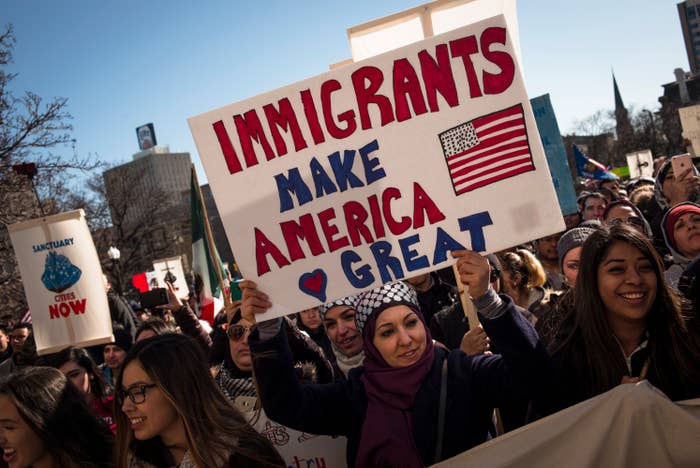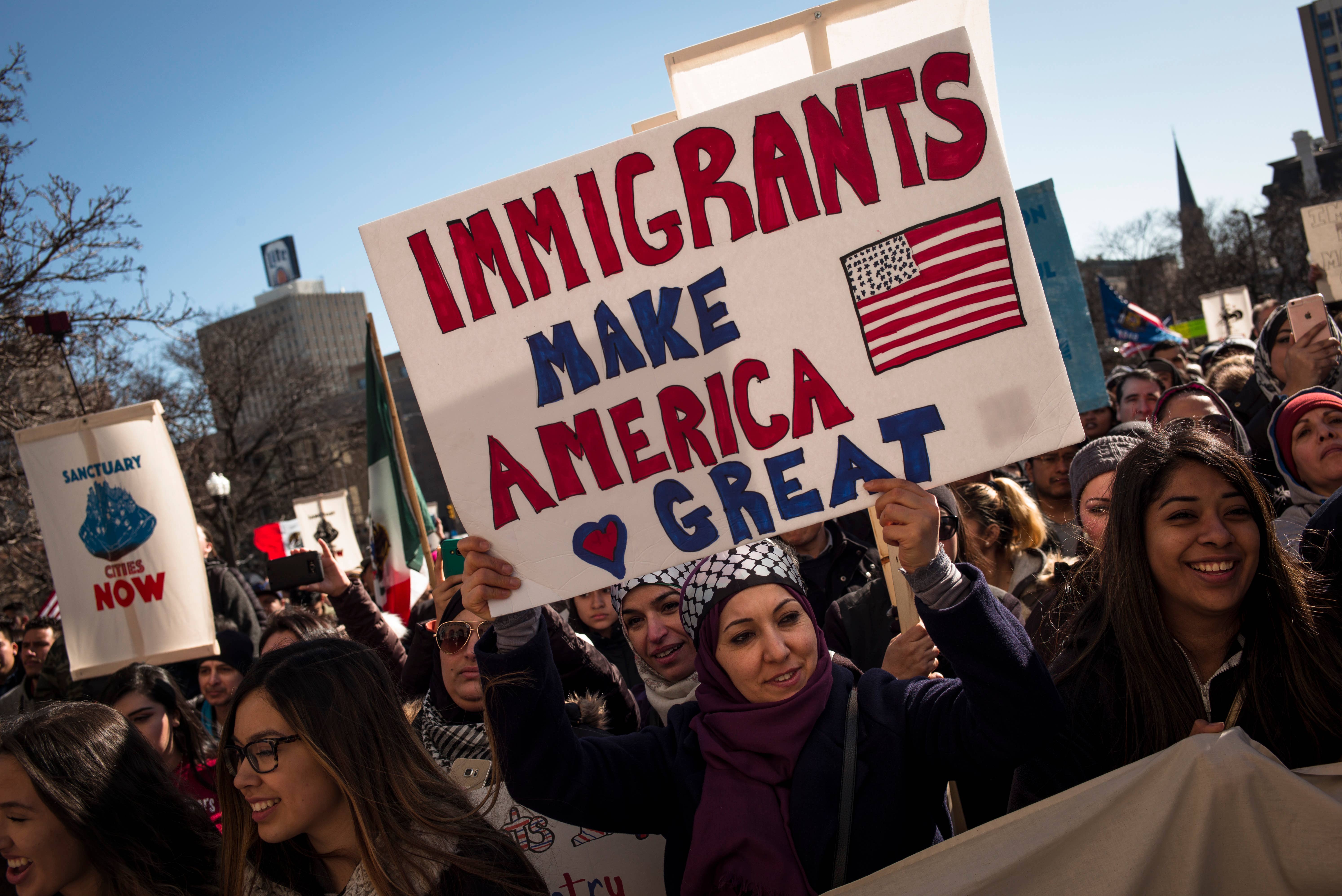
Tatiana* is an 18-year-old high school senior in Liberty, New York, who works for a youth-run ethical business cooperative and is president of her school’s community service Interact Club. She's applied to 12 colleges, is in the process of applying for 20 scholarships, and is hoping to study political science and eventually enter electoral politics so she can support her community. Tatiana should be poised to continue on her path as a high-achieving student and community leader, yet she faces an uncertain future. She grew up undocumented.
Tatiana journeyed to the U.S. from El Salvador with her two sisters when she was seven years old. At 16, she obtained temporary deportation relief and a work permit through Deferred Action for Childhood Arrivals (DACA). But under Donald Trump’s presidency, it is unclear how much longer DACA will exist. “As I saw people getting deported in the news, I started to feel unsafe. Although I have DACA it’s still uncertain, like anything could happen,” Tatiana tells Complex. “It’s a scary time.”
"We came here at a young age, it wasn’t our will to come here. We shouldn’t be punished for wanting to have a better life and trying to get an education."
There are around 1.1 million undocumented youth like Tatiana who came to the U.S. as children and have called America home ever since. Many Dreamers, as they call themselves, were too young to understand concepts like borders, immigration, or laws when their families brought them here. Despite growing up like their peers, Dreamers are forced to transition into adulthood without legal status due to America's immigration laws. For many, being deported to a country they hardly remember and haven’t set foot in since they were toddlers is not an option. DACA was the first program to offer Dreamers a state-sanctioned path to building their lives in America, but since it is an executive order, Trump could cancel it on a whim.
As a presidential candidate, Trump vowed to overturn DACA, yet two months into his presidency, it is unclear what he will do with the program. During his tenure, at least two DACA recipients have been detained by Immigration and Customs Enforcement (ICE). And a third Dreamer, whose DACA renewal was pending, was arrested by ICE and placed in deportation proceedings without a court hearing after speaking to the media about her parents’ detention.
“Ending DACA would put a big wall in front of a lot of us, myself included,” Tatiana says. “It would be really unfair. We came here at a young age, it wasn’t our will to come here. We shouldn’t be punished for wanting to have a better life and trying to get an education.”
What is DACA?
There are around 750,000 young people currently protected by DACA, an executive order signed by President Obama in 2012 that provides temporary deportation relief to qualifying immigrants who arrived in the U.S. as children. DACA recipients can obtain work authorization and, in most states, get a driver’s license. DACA must be renewed every two years, and each application requires a $465 fee. While they are not eligible for many benefits that citizens take for granted, such as federal financial aid for college, DACA allows beneficiaries to build a semblance of a normal life. A 2016 study by a coalition of immigrant rights groups found that DACA increased recipients’ hourly wages by an average of 42 percent, leading to greater tax revenue and contributions to the economy.
How does Trump threaten DACA?
The broken immigration system that allows 11 million people to live without legal status is not new, but undocumented immigrants face unprecedented uncertainty under Trump. In February, the Department of Homeland Security released Trump’s new guidelines, which include hiring thousands of new border patrol agents, enlisting police to enforce immigration laws, speeding up deportations by denying immigrants due process, and drastically expanding the definition of “criminals” who will be targeted for deportation.
“Since Trump was elected the idea of DACA being revoked has been real,” Stephanie*, a 24-year-old immigrant rights organizer living in Queens, New York, tells Complex.Stephanie works at Minkwon Center in Flushing, where she helps undocumented youth apply for DACA. Stephanie, whose family moved to the Bronx from South Korea when she was five-years-old, is a DACA recipient herself and board member at United We Dream, the largest undocumented youth-led organization in the country.
Stephanie explained that since Trump’s election, “many nonprofit organizations, including mine, have stopped processing initial DACA applications. It’s not like this president has already revoked DACA, but it’s the fear that has stopped people from applying.”
Many Dreamers believe that their years of activism are responsible for Trump’s hesitancy to end DACA. “Dreamers have become a formidable force that can’t just be wiped out,” Stephanie says. “One thing that’s certain is that the president is scared of the media shitstorm that will happen if he were to cancel DACA.”
Who are DACA recipients?
Kathryn* is a high school senior who has lived in Phoenix, Arizona, since her family fled violence in Colombia when she was two years old. “DACA changed my life completely,” Kathryn tells Complex. “I remember my parents struggling with not having enough money for the bills, so as soon as I got DACA it was such a difference that I could get a job.”
Kathryn, who received DACA in her freshman year of high school, has many dreams for her future in the U.S.—but those dreams are contingent on having DACA or a permanent route to legal status. “I want to study criminal justice. I want to be a lawyer to help many people who are undocumented,” she says. “I’m also an activist and I love expressing myself with art.”
When asked if she has any memories from being a baby in Colombia, Kathryn says, “I remember the park, they had really pretty grass. Aw crap I’m going to cry...” Kathryn has never been able to return to Colombia to visit her family because she might not be able to re-enter the U.S. “I remember my grandma and grandpa. I remember her singing me all these songs. My grandma passed away and I couldn’t see her.”
Roberto*, now 27, has lived in South Florida since he immigrated from Peru with his family when he was 12. He is pursuing his associate’s degree in mechanical engineering at a Miami community college, slowly taking classes as he can afford them. He also works to protect and educate immigrant youth as part of a local student group.
“During Obama’s presidency, having DACA was really a peace of mind,” Roberto says. “As long as we stayed out of trouble we weren’t going to be targeted.” Getting DACA allowed Roberto to work legally, giving him the chance to get a better job. He was also able to get a driver’s license, which makes life much easier in South Florida, where public transportation is not a viable option.
For Roberto, leaving the U.S. is not a possibility. “The U.S. has been my country for the last 15 years. It is my country. I love beer, barbecue and football,” he said, laughing. “I don’t think it gets more American than that. I grew up here. My family is here. My friends are here. I made a life here.”
Who does DACA leave behind?
While they face unwarranted hardships, DACA recipients recognize that they are relatively lucky; most undocumented immigrants have no path to legal relief, temporary or otherwise. As part of their organizing strategy, Dreamers have used their respective privilege to champion their families and communities.
“DACA is an elitist program which pushes the narrative that there are some immigrants who deserve to be here and some immigrants who don’t,” Stephanie explained. “Though there are specific things we disagree with about DACA we still consider it to be a success.”
“We have to be able to talk about immigration from an inclusive, mindful perspective. Otherwise when we’re fighting for our own liberation, we end up oppressing others,” added Roberto. “Because we are at the forefront of the discussion, we have to help pull in other people that can be forgotten.”
“DACA is not at all a program that helps what I would say are the most vulnerable of the very vulnerable population of undocumented youth,” explained Sei Young Pyo, who provides legal services to low-income trans and gender nonconforming (TGNC) clients at the Sylvia Rivera Law Project. DACA recipients fit into society’s definition of the “good immigrant” working hard to better themselves and society. Yet as Pyo explained, “Survival crimes are huge for immigrants who don’t have community or economic support.” If they have a criminal record or could not complete high school, undocumented TGNC folks can be relegated by lawmakers into the category of “bad immigrants” who don’t deserve benefits like DACA.
Given Dreamers’ symbolic status, their arrest and deportation would send a disturbing message to the broader undocumented population. At the same time, Dreamers are preparing to fight any legislation that pits their safety against that of other undocumented immigrants. “We’re preparing to oppose any laws trying to leverage the lives of DACA people in order to deport who Donald Trump says are criminals,” Stephanie said.
There is little hope for comprehensive immigration reform under Trump’s administration and a Republican Congress. Yet, as Roberto reminds us, “We cannot get stuck in what Washington is going to do. We have to take care of our communities right here, right now.” As politicians play dangerous games with the lives of immigrants, immigrants continue building resistance. They have no other choice.
Dreamers should be able to do everyday things that many of us who are citizens take for granted. Kathryn should be able to travel back to Colombia to visit her grandfather while he is still alive without giving up her dreams of being an attorney. Tatiana shouldn’t have to fear that one day, she will come home from school to find her mother missing because ICE raided the poultry factory where she works. Roberto should be able to watch football and drink beer without the threat of being detained hanging over his head. Stephanie should be able to continue advancing immigrant rights without worrying that she will lose her job if her DACA renewal is not processed in time. No government should define a human being as illegal.
*Last names have been excluded to protect identities given the dangers of publicly speaking with the media in the current political climate.

